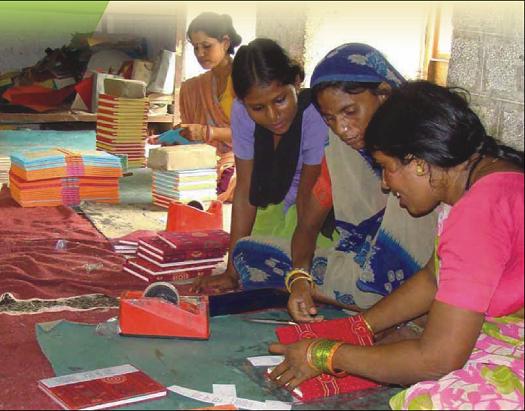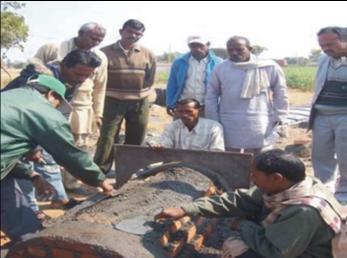| A Venture to Build Capacity
in a Skill Deficit Nation
It is the other side of the story of a fast-growing economy like India that needs to be highlighted. As development analysts, it is all the more necessary for us to take stock of the unemployment problem. There is need of skilled workers all around the world but India is yet to cope with the situation and make the industry available with the much-needed skilled workforce.

According to the report of the National Commission on Labour, there exists a challenge of labour competitiveness vis-à-vis China and other nations: India has been facing competition from China and other South East Asian nations in various sectors. The workforce of these Asian nations is disciplined and cheaper as compared to the Indian workforce. With China becoming a member at the WTO meeting at Doha, Qatar, the challenge to the Indian workforce to remain competitive has increased manifold. As per the World Competitiveness Report (2005), which examines the competitiveness of human resources based on skills, motivation, flexibility, age structure and health of people, India is ranked to be the least competitive amongst the 10 newly industrialised countries. In India the quality of skilled labour, according to the report, is good but the proportion of skilled labour in the total labour force of the country is too small. As a result, though India has ranked among the first 10, there is a need for general education for most jobs, possession of ‘marketable skills’ (or specific skills) is a must for the labour force to obtain employment. The NSSO Survey on Employment & Unemployment conducted in January - June (2004) gives information on the possession of 30 specific marketable skills by persons in the labour force. This is enough to gauge the labour supply conditions in India.
TARA Livelihood Academy (TLA) is a new committment by Development Alternatives (DA) to build up the capacity of the rural youth and unemployed in order to make him/her get a decent job or establish his or her own enterprise. These services will create secure livelihoods; enable communities to manage resources in a sustainable manner and build institutional, financial and market linkages, which in turn, empower communities to become active participants in mainstream society and the national economy. The days of independent, isolated economies are over. Globalisation is redefining business practices worldwide and will continue to shape the way of training and capacity building in the future. Designed specifically for participants who will be interested in acquiring practical, applicable, need-to-know skills, the TLA’s training programmes combine real-world communications and instructions with intensive training. The varied areas where TLA provides training ranges across Livelihood Promotion, Local Institution Development, Institutional Development, Programme Management, Training in Functional Skills as well as ICT skills, which are the highest on demand in the market.
Speaking of the mandate area where DA works, almost the entire Bundelkhand region in Central India except for Jhansi has been covered under National Rural Employment Guarantee Scheme – a government programme aimed not only to provide rural employment but also at restoring infrastructures in villages by undertaking water conservation, repair and upkeep of village tanks, among other things. But so far, there are many blocks where not a single household has received 100 days of work or unemployment allowance. | | THE TRIPLE ‘E’ FORMULA AND TLA
Tara Livelihood Academy has been the latest addition to the DA Group. Created with a purpose of consolidating the knowledge gathered by DA and developing a series of capacity building training programmes for its dissemination, TLA has a mandate to fulfill. It aims to create jobs for sustanible livelihoods. Employability skills, Entrepreneurship development and Executive focus are the three catogries of trannie that TLA will concentrate on The ‘Employability skills’ the first ‘E’ of the training will essentially look to work with the skill-less youth who require basic skills to make a livelihood and also contribute positively to the labour force. Training on skills like gardening, haircutting, tailoring, cooking, etc., will make the rural youth (X class) employable in the job market. There is a commitment of placing these people in the industry which has been demanding a skilled labour.
‘The SME sector in India needs to grow’ has been the rhetoric of the economists closely watching the Indian economy and its growth. It is observed that as India has a good growth rate; it is the SME sector that will provide job opportunities to the increasing population in India. The objective of the GOI - to make its large populace a human resource - will be through enterprise development only, which will turn the tide in favour of India. The Second ‘E’ namely Entrepreneurship Development is DA’s pioneer work. It belives firmly in creating many enterprenuers and giving them the much-needed boost by providing capacity building and doing the handholding for some time and also giving the necessary linkages for their development. From making a business plan to learning to have a strong market linkage are the highlights of these training programmes. Micro-credit and micro-enterprise development are some of the training programmes conducted by the TLA.
The third ‘E’ is all about the Executive. NGOs, Government Agencies and the Corporate Sector need to upgrade the executive’s skills to improve his as well as the organisation’s efficiency. This training forms the basis of the fee-based training programmes held by the TLA and focuses on the orientation of the Executive towards development issues. Soft skills like Communication and Presentation to updating the existing knowledge about carbon revenue or the green building techniques are some of the training programmes conducted by the TLA in this category.
• Skill is a measure of a worker’s expertise, specialisation, wages, and supervisory capacity. Skilled workers are generally more trained, better paid, and have more responsibilities than unskilled workers.
• Some of the most sought after skills are Communication skills, Analytical skills, Computer skills, leadership/management skills, problem solving skills, etc. | | 
This is the reality that we can see on ground in Bundelkhand where the number of unemployed is on the rise due to the drought conditions prevailing for the past four years. Soaring unemployment adds to the numbers on the BPL list as also large-scale migration, which leaves the land deserted.
The DA Group has been working closely with the community in Bundelkhand and the unemployment and poverty situation have always been crucial areas that DA wants to address earnestly. With the global economy being affected and reflecting a downward trend, climate change and environment degradation has affected the rural economy adversely.
Regular training of masons for the ever-increasing construction industry is held on skill-based training attended by masons who want to upgrade their skills as also the youth who want to take up the profession. Similarly, training on skills like Brick Making, Charring and Briquette making, Concrete Cement Paving Blocks, Food Processing and Preservation, Handmade Paper Product Making, Eco-friendly Honey Harvesting, Poultry Farming, Bio-composting Techniques, Fabrication of Bio-sand Filters are some skills that regular training is imparted either through projects or on demand basis, which requires customisation as per the requirement of the client.
The TLA will prove to be beneficial to the entire education and training system in Bundelkhand. As the trainees establish their position in the society, standards will rise and the vocational training system as a whole will gain in confidence and authority.

Here, it is worth mentioning the executive training where the TLA has been proactive in parallel promotion of functional skills like Proposal Writing, Documentation & Process Report Writing, Data Analysis & Reporting, Moderation, Communication & Presentation Skills (Verbal & Written), Computer Operating, Management Information System which form the crux of the scaling up processes of skill advancement. These training programmes are usually attended by the middle level and top level functionaries who want to upgrade their skills and knowledge. Short training programmes of a duration ranging from 3 days to 15 days are also offered along with certification.
The TARA Livelihood Academy will set new standards in congruence with the National Policy on Skills Development of the Government of India aimed at responding to challenges and providing a direction for the future for training as it is designed to provide learners with the skills they need in the real world of work, now as well as in the future. This means redesigning, reshaping and adding to our current training programmes and qualifications in a way that best suits our industries.
More recently, the International Labour Organisation (ILO), United Nations Environment Programme (UNEP) and the International Trade Union Confederation (ITUC) have come out with a joint initiative with Green Jobs as the main theme which aims to fulfill their Decent Work Agenda in the Asia and the Pacific Region. In this initiative, Green jobs has the potential to create productive work for women and men in protecting the environment and improving their living standards. DA, right from its inception, has been creating Green jobs that have been sustainable in nature. TARA Livelihood Academy, thus, has an inbuilt agenda to create green jobs and further the ILO objective through a Green Jobs project.
It is a challenge for the TARA Livelihood Academy to make the rural youth overcome their inabilities to access the opportunities available in the job market and simultaneously address the development issues of their area by educating, skill enhancement and providing them with the right linkages that would bring in a sunrise that will eventually help in crafting the ‘Shining India’ that we all dream of.
q Bhavana Gadre
bgadre@devalt.org Back to Contents | |


